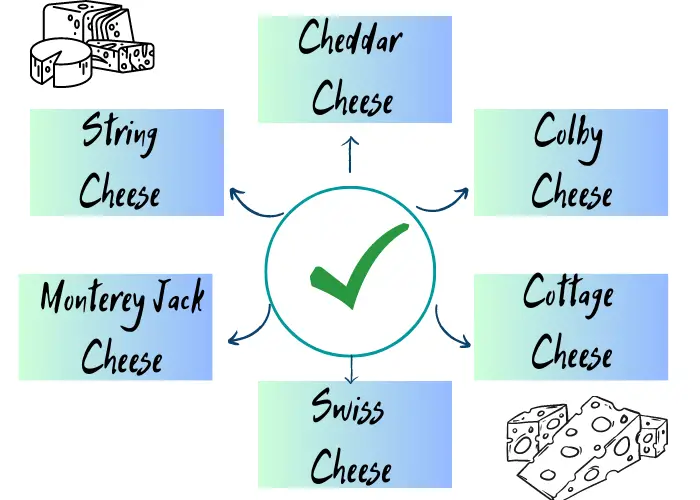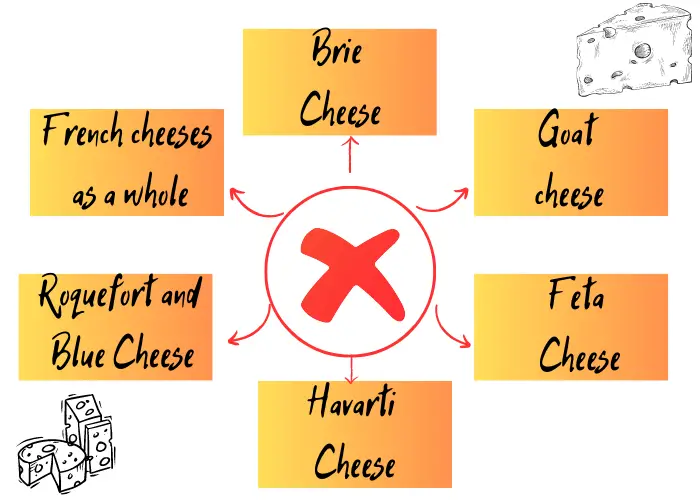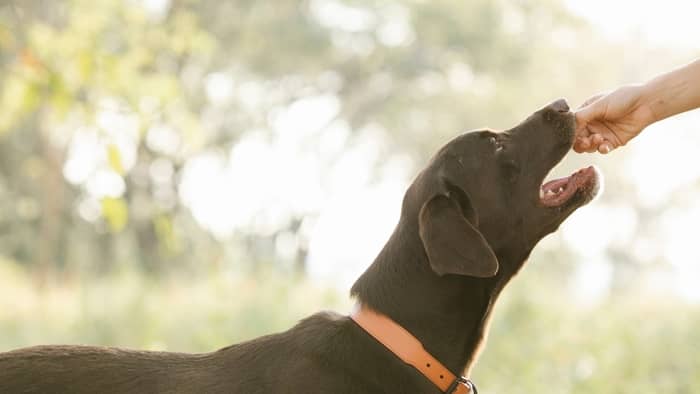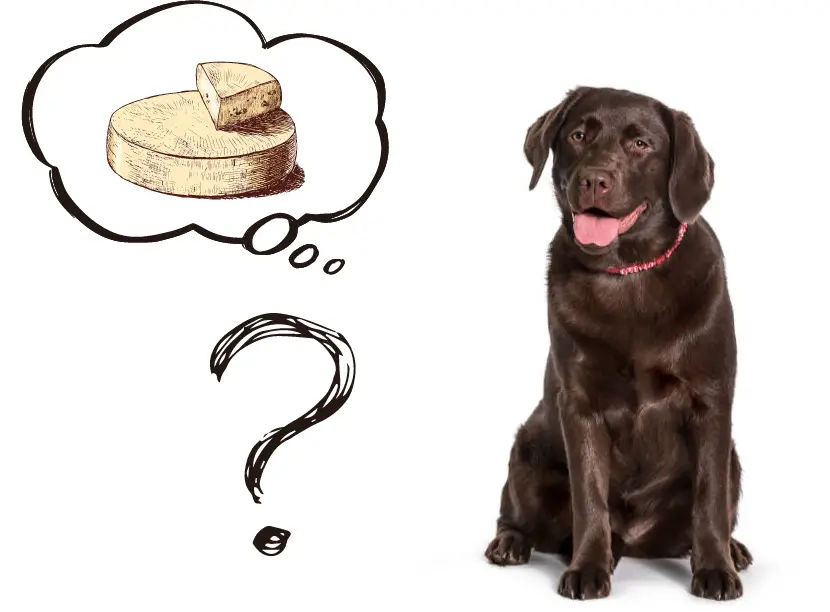Last Updated on November 11, 2023 by Linda Richard
Dogs love to eat all kinds of stuff and they are technically omnivores, which brings up the question – can dogs eat Gouda cheese and is cheese toxic to them? As a type of diary, cheese should be about as “ok” for dogs as it is for humans, right?
Yes and no. Dogs can technically eat different types of cheese such as gouda cheese. However, it’s not really “healthy” for them. Then again, it’s questionable how “healthy” it is for people too. All in all, while cheese has a few benefits for dogs and while it’s not strictly “toxic” the way some other foods are – it’s also not recommended. The many health drawbacks of cheese just aren’t worth it most of the time.
So, can dogs eat gouda cheese? Yeah, they can – but most of the time they really shouldn’t.
Table of Contents
Can Dogs Eat Gouda Cheese?
There is nothing strictly toxic in gouda cheese for dogs. However, the same things that make excessive consumption of cheese unhealthy for us make it even more unhealthy for dogs.
Cheese does contain a bit of calcium which is a benefit that’s been greatly overhyped by the food industry for both canines and humans. However, most types of cheese such as gouda also contain large quantities of saturated fat which are anything but healthy. At the very least, this saturated fat can lead to your dog getting overweight – something that labs are very prone to.
And then there‘s the significant risk of additional health problems such as heart attacks and other heart conditions. All this means that while gouda cheese is OK for dogs in small quantities, it really isn’t recommended as a regular snack, a major part of their diet, or even just as a frequently used treat.
Can Dogs Have Cheese At All and How Does Gouda Compare To Other Types Of Cheese?
Gouda is neither the best nor the worst type of cheese you can give to your dog. Overall, all types of cheese can be acceptable for canines in a very strict moderation but some are definitely better than others.
What Are The More Acceptable Types Of Cheese For Dogs?
The “better” types of cheese for dogs will be leaner and will contain less saturated fat as well as just a little bit of lactose. These include but are not limited to:

What Are The Most Unhealthy Types Of Cheese For Dogs?
In short, the least recommended types of cheese are the fatty and rich types of cheese. Another very unhealthy group is that of cheeses with herbs or other food add-ons such as garlic. Some of the most common ones include:

Cheeses with herbs, garlic, or other flavorings can be outright dangerous and even deadly for your dog. While gouda doesn’t fall in this group, this is a big reason to always be careful with cheese and always read their labels.
What Are The Main Drawbacks Of Cheese For Your Dog?
The overabundance of saturated fat is far from the only problem with gouda and other types of cheeses when it comes to dogs. With many types of cheese, fat is the major issue, however. Goat, Brie, and Feta cheeses, for example, can easily lead to pancreatitis in your canine – a major and life-threatening condition in dogs. Gouda is sort of middle-of-the-road in terms of saturated fat – it’s neither too fat nor too lean.
Another common problem is the lactose in cheeses. Lactose is a type of sugar that’s typical for milk and dairy products as a whole. Some cheeses have more lactose and others – less, depending on how they are made. Too much sodium/salt can also lead to high blood pressure in your pooch.
Why Is Lactose A Problem?
Aside from being a type of cheese, lactose can also cause lactose intolerance in dogs – something canines are much more susceptible to than humans. If your dog is lactose intolerant you can expect to see problems such as vomiting, diarrhea, a decreased appetite, flatulence, bloating, and more.
A rare but major problem cheese can lead to in dogs includes roquefortine – a potentially lethal toxin. While this toxin isn’t supposed to be present in gouda cheese, it’s common in other types such as Roquefort cheese.
Can Dogs Eat Gouda Cheese and Get Any Benefits Out Of It?
The two main benefits of gouda and other types of cheese for dogs are that 1) they can help a dog gain weight when that’s needed and that 2) dogs absolutely love them. That last part makes cheeses a very effective training treat.

Read more about: Black Lab Average Weight
Can Dogs Have Parmesan Cheese?
Parmesan isn’t technically toxic for dogs so a few bites a week are ok. It is very salty, however, so don’t go overboard with it.
Can Dogs Have Cream Cheese?
Plain cream cheese can be ok in moderation if your dog isn’t lactose intolerant. However, flavored cream cheeses can be very dangerous.
How Can You Figure Out If Your Dog Is Lactose Intolerant?
The way to determine if your dog is lactose intolerant is simple. Just keep a lookout for any of the following symptoms after even just one bite of cheese:
- Vomiting
- Diarrhea
- Bloating
- Flatulence
- Loss of appetite
How Much Gouda Cheese Is Too Much For Your Dog?
As a rule of thumb – 2-3 pieces of cheese treats once or twice a week are acceptable for most canines. The exact size of the treats will depend on the dog’s weight. Bite-sizes treats are what we’re talking about, however. Going on a once-a-day schedule with cheese treats is not a good idea for any dog, however, even if it isn’t lactose intolerant.
What To Do If Your Dog Has Eaten Too Much Cheese All At Once?
If your dog has started to experience vomiting, diarrhea, flatulence, or other symptoms of lactose intolerance, contact your veterinarian immediately. If your dog has overeaten with cheese or has eaten flavored cheese you may need to get it to the vet as soon as possible.
So, Can Dogs Eat Gouda Cheese?
In a word – yes. In three words – only in moderation. All types of cheese are a very tasty snack and a great training treat but are generally very unhealthy.


4 thoughts on “Can Dogs Eat Gouda Cheese and Is Cheese Toxic To Them?”